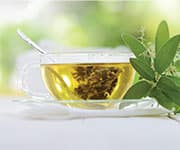Life Extension Magazine®
Tea May Protect Against Coronary Artery Disease

A review of randomized trials published in the journal Clinical Nutrition ESPEN, concluded that regular intake of green tea and its active components may help reduce the risk of cardiovascular disease.*
Among the effects revealed by the trials, regular tea consumption was associated with lower blood pressure and enhanced bioavailability of nitric oxide, which indicate a beneficial effect for tea on endothelial function. In some studies, tea was associated with lower markers of oxidative stress and inflammation, both of which also suggest improved endothelial function.
Editor's Note: "The reduction of oxidized low-density lipoprotein and C-reactive protein levels could be a sign of improved endothelial function in individuals at increased risk of developing CVD," the authors stated.
* Clin Nutr ESPEN. 2021 Feb;41:77-87.
Biological Age Reversed with Diet, Lifestyle

The journal Aging published the results of an eight-week randomized clinical trial which resulted in a reduction in biological age among men who participated in lifestyle changes and consumed nutritional supplements.*
In this eight-week diet and lifestyle treatment program, the Horvath DNA methylation age (DNAmAge) test was used to assess biological age. This DNAmAge test is considered the most accurate method to assess whether an intervention(s) is slowing or reversing biological aging.
The Horvath DNAmAge clock evaluates DNA methylation patterns as a marker of biological age.
The "Horvath Clock" is named after Steve Horvath, Professor in Human Genetics and Biostatistics researcher at UCLA.
Eighteen men, aged 50 to 72, consumed a plant-based, low carbohydrate diet that included limited animal proteins and was supplemented with a vegetable and fruit powder and a probiotic.
The healthy diet/lifestyle group had scores averaging 1.96 years younger at the end of the program than at the beginning, while control participants averaged 1.27 years older at the end.
The difference between the healthy diet/lifestyle group and the controls was 3.23 biological years.
Editor's Note: The lifestyle group was advised to do a minimum of 30 minutes of physical exercise daily and to perform breathing exercises twice daily to reduce stress.
* Aging (Albany NY). 2021 Apr 12;13(7):9419-9432.
Melatonin Helps Prostate Cancer Patients

Research published in Oncotarget found an increase in survival among prostate cancer patients with a poor prognosis who were treated with melatonin, the sleep-promoting hormone.*
For men with a poor prognosis who did not use melatonin, overall survival was 64 months. For those treated with melatonin it was 153.5 months. Men who had a favorable or intermediate prognosis did not significantly differ in median overall survival during follow-up.
At a five-year median follow-up, patients who received melatonin had survived an average of 13 months longer than those who did not receive it.
Editor's Note: The retrospective study included 955 men who received standard treatment for prostate cancer between 2000 and 2019.
* Oncotarget. 2020 Oct 13;11(41):3723-3729.
Fewer Migraines with Diet Rich in Omega-3 Fatty Acids

Fewer migraine headaches occurred among 182 patients who consumed a diet richer in omega-3 fatty acids than a control group, The BMJ reported.*
Participants were given either a high-omega-3 diet that provided 1,500 mg per day EPA and DHA, a high-omega-3/reduced-omega-6 diet, or a control diet that provided average U.S. intakes of EPA and DHA and 7.2% of daily calories from the omega-6 fatty acid linoleic acid for 16 weeks.
Headache frequency declined by two days per month in the high-omega-3 diet group and by four days in the high-omega-3/reduced-omega-6 group.
Editor's Note: Time spent daily with a headache was lowered by 1.3 hours in the high-omega-3 group and by 1.7 hours in the high-omega-3/reduced-omega-6 group.
* BMJ. 2021;374:n1448.

